Navigating Cyber Crime Laws in India: A Legal Perspective

Navigating Cyber Crime Laws in India: A Legal Perspective
The rapid proliferation of digital technologies has transformed India’s social, economic, and professional landscape. While digitalization brings efficiency and innovation, it also exposes individuals and businesses to cybercrime risks. As a lawyer in India, it is crucial to understand the evolving challenges posed by cybercrime and the legal framework governing this domain.
What is Cybercrime?
Cybercrime refers to illegal activities carried out through digital devices, often with the intent to steal sensitive information, disrupt services, defraud individuals, or exploit digital systems. In India, common examples include online fraud, data breaches, identity theft, cyberstalking, hacking, phishing attacks, and ransomware.
Key Cybercrime Laws in India
India’s response to cybercrime is primarily driven by the Information Technology Act, 2000 (IT Act), amended in 2008. This legislation defines various cyber offenses, assigns penalties, and equips investigative authorities with tools to track and prosecute offenders. Here are some critical sections:
- Section 66: Addresses hacking and unauthorized access to computers, carrying penalties of imprisonment and fines.
- Section 67: Criminalizes the transmission and publication of obscene material online.
- Section 72: Enforces the confidentiality and privacy of information, penalizing unauthorized data disclosures.
- Section 66F: Covers cyber terrorism, carrying severe punishments, including life imprisonment.
The Indian Penal Code (IPC) complements these provisions, applying to cyber offenses like defamation, fraud, and extortion when perpetrated in digital spaces. The integration of cybercrime into broader criminal law ensures the applicability of traditional criminal justice mechanisms to digital offenses.
Key Challenges in Combating Cybercrime
Despite having a strong legal framework, India faces significant hurdles in effectively combating cybercrime:
- Rapid Technological Advancements: The pace of technological change makes it challenging for laws to stay current. Emerging threats like AI-driven fraud, cryptocurrency crimes, and deepfake technology demand innovative regulatory responses.
- Cross-Border Jurisdiction: Cybercrime often transcends national borders, creating enforcement complexities due to differing international laws and regulations.
- Limited Resources and Expertise: Many law enforcement agencies lack the advanced training and technical resources needed for digital forensics and cyber investigations.
- Balancing Privacy and Security: Cyber investigations often necessitate digital tracking and surveillance, raising concerns about data privacy and civil liberties.
Reporting and Enforcement Mechanisms
India has taken proactive steps to combat cybercrime through specialized Cyber Crime Cells across states and dedicated initiatives such as the Indian Cyber Crime Coordination Centre (I4C). Victims can report incidents via India’s Cyber Crime Reporting Portal. Law enforcement agencies collaborate with private tech companies, cybersecurity experts, and international bodies to address cyber threats holistically.
Recent Developments and Future Prospects
The upcoming Personal Data Protection Bill promises to strengthen citizens’ data privacy rights by introducing stricter rules for data handling, processing, and storage. This legislation aims to strike a balance between national security, data governance, and individual privacy.
Conclusion
The fight against cybercrime in India is multifaceted and constantly evolving. Lawyers, businesses, and individuals must remain vigilant, adapting to new threats while advocating for enhanced regulatory measures. As legal professionals, staying informed and contributing to policy discourse can play a vital role in shaping a safer digital future for India.
Post Categories
Featured Posts
Latest Posts
Latest Posts

Petition Against IIT Eligibility Criteria Of In Class Dismissed...
A vacation bench of Justices Sudhanshu Dhulia and K V Vishwanathan said this prerequisite existed earlier as well and it was not inclined to intervene in the matter New Delhi nbsp The Supreme Court on Monday dismissed a plea challenging...

CJI DY Chandrachud Launches e-DHCR Portal calls it 'Powerful Platform' For Digital Publication of...
Chief Justice of India Justice DY Chandrachud on Monday launched the e-DHCR portal a user friendly official platform for reporting the judgments of Delhi High Court nbsp CJI Chandrachud said that the initiative marks a ldquo profound shift rdquo in...

Children Born Out Of Irregular Marriage Legitimate Muslim Law Supreme Court...
The Rajya Sabha has passed the JThe Supreme Court has noted that children born out of irregular marriages including one between a Muslim man and a Hindu woman are legitimate and therefore eligible to inherit intestate property as per applicable...

Supreme Court Notice To Airlines Regulator Over Pee-Gate Victim s Petition...
New Delhi nbsp The Supreme Court Monday agreed to examine the plea of a -year-old woman on whom a male co-passenger allegedly urinated on board an Air India flight in November last year seeking a direction to the Centre aviation...

Contract Law in the Digital Age How E-Contracts Are Transforming Legal Agreements...
In today's fast-paced technology-driven world traditional paper-based contracts are swiftly being replaced by electronic contracts or e-contracts This shift is transforming the way legal agreements are created executed and enforced Here rsquo s an in-depth look at how e-contracts are...

ED Summons Under PMLA What to Do and What Not to Do Complete Legal...
Receiving a summons from the Enforcement Directorate ED under the Prevention of Money Laundering Act PMLA can be intimidating For many individuals mdash business owners directors promoters professionals or even family members mdash an ED summons creates panic confusion and...

Speak With Our
Get a Appointment
















